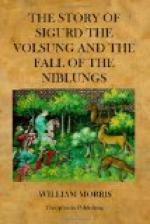But no long while he abode there, but into the thicket he went,
And the wolfish heart of Sigmund knew somewhat his intent:
So he came again with a herb-leaf and laid it on his mate,
And she rose up whole and living and no worser of estate
Than ever she was aforetime, and the twain went merry away.
Then swiftly rose up Sigmund
from where his fosterling lay,
And a long while searched
the thicket, till that three-leaved herb
he found,
And he laid it on Sinfiotli,
who rose up hale and sound
As ever he was in his life-days.
But now in hate they had
That hapless work of the witch-folk,
and the skins that their bodies
clad.
So they turn their faces homeward
and a weary way they go,
Till they come to the hidden
river, and the glimmering house they know.
There now they abide in peace,
and wend abroad no more
Till the last of the nine
days perished, and the spell for a space
was o’er,
And they might cast their
wolf-shapes: so they stood on their feet
upright
Great men again as aforetime,
and they came forth into the light
And looked in each other’s
faces, and belike a change was there
Since they did on the bodies
of wolves, and lay in the wood-wolves’
lair,
And they looked, and sore
they wondered, and they both for speech
did yearn.
First then spake out Sinfiotli:
“Sure I had a craft to learn,
And thou hadst a lesson to
teach, that I left the dwelling of kings,
And came to the wood-wolves’
dwelling; thou hast taught me many things
But the Gods have taught me
more, and at last have abased us both,
That of nought that lieth
before us our hearts and our hands may be
loth.
Come then, how long shall
I tarry till I fashion something great?
Come, Master, and make me
a master that I do the deeds of fate.”
Heavy was Sigmund’s visage
but fierce did his eyen glow,
“This is the deed of thy mastery;—we
twain shall slay my foe—
And how if the foe were thy father?”—
Then he telleth
him Siggeir’s tale:
And saith: “Now think upon it; how
shall thine heart avail
To bear the curse that cometh if thy life endureth
long—
The man that slew his father and amended wrong
with wrong?
Yet if the Gods have made thee a man unlike all
men,
(For thou startest not, nor palest), can I forbear
it then,
To use the thing they have fashioned lest the
Volsung seed should die
And unavenged King Volsung in his mound by the
sea-strand lie?”




